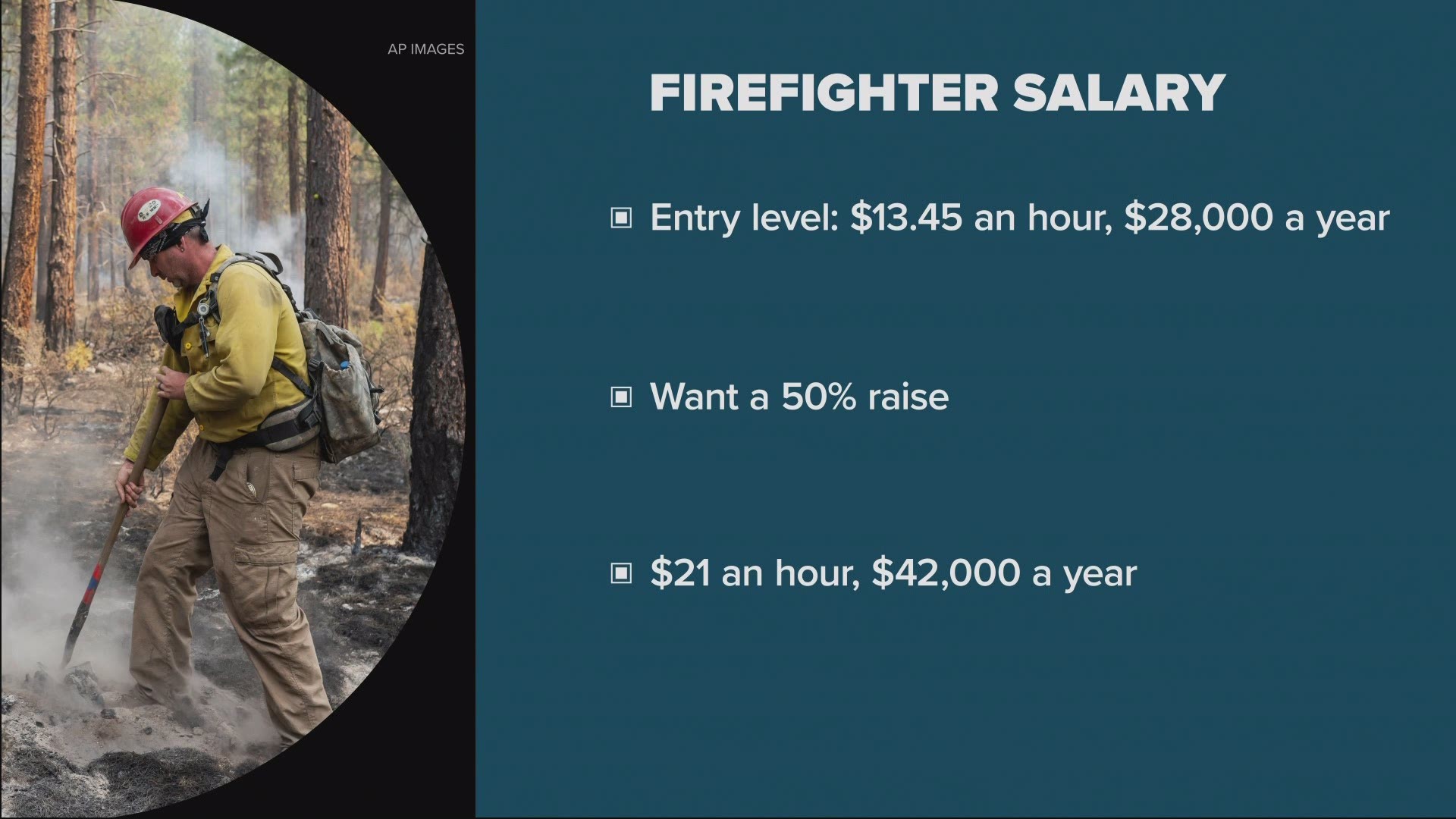PORTLAND, Ore. — As thousands of federal wildland firefighters battle the Bootleg Fire and other wildfires raging across Oregon and Washington, firefighters and advocates say they aren't earning enough money to retain the number of workers they need.
An entry-level firefighter with the U.S. Forest Service currently starts at $13.45 an hour.
Smokejumper Ben Elkind wrote in an opinion piece for The Oregonian/OregonLive, "At the Lincoln City McDonalds, just west of Otis, another community nearly erased from the map by wildfires, a sign in the window advertised starting pay is $15 an hour. My wife joked that I should apply there for more job security. She’s right."
Elkind wrote that he's never earned more than $20 an hour in 14 years as a wildland firefighter, even as an incident commander with advanced qualifications.
Kelly Martin, a retired wildland firefighter, is now the president of Grassroots Wildland Firefighters, an advocacy organization working to improve compensation and comprehensive well-being for federal wildland firefighters. She said well-qualified firefighters are leaving the Forest Service in search of better opportunities, leaving the remaining workforce stretched thin in the face of escalating fire danger.
"Resources are stretched so incredibly thin that nationally, we have to prioritize where those scarce resources go," she said. "That's almost unheard of for July in a normal fire season. This year and last year, there's been a tremendous strain on the system to get the resources that we really need."
When wildland firefighters deploy to a fire, they have to leave their homes and their families for a minimum of 14 days, Martin said, along with the days of travel to and from the fire. When they arrive, they often work up to 16 hours a day, facing grueling conditions. Firefighters face the stress of heat and physical labor, along with exposure to smoke and environmental hazards, and sleep deprivation and fatigue, according to the Centers for Disease Control. They also face the risk of serious injury or death
Martin said the mental stress can weigh on the firefighters for years.
"These are people that are working in some of the most dangerous environments," Martin said. "If they've been involved or witnessed a traumatic accident or a fatality of their colleague, these kinds of experiences have long-term mental and emotional impacts on people."
Federal firefighters do qualify for hazard pay, a 25% increase in wages, when they work in defined hazardous conditions for any part of the day. They also qualify for overtime pay, often working 16 hours a day.
Elkind wrote that firefighters' pay is not commensurate with the risk and difficulty of the job.
"I make decisions that can cost millions of dollars with lives hanging in the balance, yet I am paid more like a teenager working a summer job than a highly experienced professional," Elkind wrote.
Fighting wildfires is now nearly a year-round job, Martin said, and firefighters need to be treated as full-time career professionals.
The cumulative impact of the low pay and high stress is causing federal wildland firefighters to go look for work somewhere else, Martin said. She said that wildland firefighters are trained to have the skills to work for 10-15 years for the Forest Service, but that many of them take those skills and seek work with better compensation, benefits, and work-life balance.
Starting salaries are often higher at municipal fire departments. A firefighter trainee for Portland Fire and Rescue starts at $15.08 per hour, and the lowest salary for a fully-trained firefighter is $50,826 per year.
"Last summer, I trained someone from Seattle Fire who earned more in two weeks than I earned in a six-month fire season," Elkind wrote. Firefighters report not being able to afford housing in areas of the west coast near the fires, some of them living in vehicles in between battling wildfires.
Grassroots Wildland Firefighters is asking for a 50% increase in starting pay for firefighters, along with proper job classification and mental health reforms. In June, the Biden administration approved raising starting wages to $15 an hour, and converting nearly 1,000 firefighters to full-time employees.

